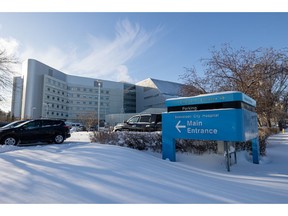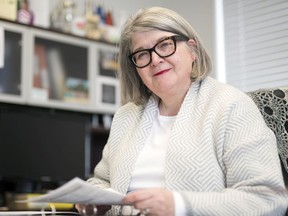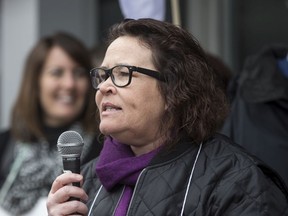The SHA aims to hire 150 permanent, full-time staff from the Philippines to bulk up a health-care system depleted by COVID-19.
Author of the article: Zak Vescera
Publishing date: Jan 05, 2022

The SHA says the hiring is part of a 2022 recruitment drive.
PHOTO BY MICHELLE BERG /jpg
Saskatchewan is once again turning to the Philippines to fill a gap in its health-care labour force.
The Saskatchewan Health Authority aims to hire 150 permanent, full-time nursing and laboratory staff from the Philippines this year to bulk up a health-care system hammered and depleted by the COVID-19 pandemic.
Health-care unions expressed support for any efforts to fill the gap — but noted foreign workers must be supported.
“We could not be without our Filipino nurses,” Saskatchewan Union of Nurses President Tracy Zambory said. “They are a gigantic asset and we could not run without them. We just have to make sure that we are taking lessons from the past.”
Saskatchewan is once again turning to the Philippines to fill a gap in its health-care labour force.
The Saskatchewan Health Authority aims to hire 150 permanent, full-time nursing and laboratory staff from the Philippines this year to bulk up a health-care system hammered and depleted by the COVID-19 pandemic.
Health-care unions expressed support for any efforts to fill the gap — but noted foreign workers must be supported.
“We could not be without our Filipino nurses,” Saskatchewan Union of Nurses President Tracy Zambory said. “They are a gigantic asset and we could not run without them. We just have to make sure that we are taking lessons from the past.”

SUN president Tracy Zambory says Filipino nurses are essential to Sask.’s health care system.
PHOTO BY TROY FLEECE /Regina Leader-Post
Saskatchewan sent a delegation to the Philippines in 2008 as part of a hiring blitz to recruit 800 new registered nurses. University of Calgary assistant professor of sociology Naomi Lightman, who studies migration and care work, said such recruitment drives are not uncommon.
“There’s an entire industry built in the Philippines to train and then export (staff) to work in health care in other, typically wealthier countries,” Lightman said.
As of 2016, Statistics Canada estimated nearly a quarter of nurse aides, orderlies and similar professionals in Saskatchewan were immigrants — more than twice the share of newcomers working in all other jobs. The same study found nearly 30 per cent of such professionals across Canada were Filipino, the vast majority women.
SEIU-West President Barb Cape said she was surprised the SHA was only seeking 150 staff. She said there are more than 1,000 job vacancies in the SHA, many of them on a “hard to recruit” list.
Statistics Canada data show there were 330 vacancies in professional nursing positions in Saskatchewan at the end of the third quarter of 2021, compared to 220 in the prior quarter. Cape said she believes some of those issues are chronic, but COVID-19 has resulted in hundreds of staff reducing hours, looking for new work or leaving the field altogether.
“We’ve seen people retire, throw up their hands and quit. People have just had it,” she said.

SEIU-West President Barbara Cape
PHOTO BY LIAM RICHARDS /Saskatoon StarPhoenix
Cape and Zambory said the SHA must take steps to ensure new arrivals settle in comfortably. Cape said many staff from the Philippines who came in 2008 and the following years did not stay, in part because of issues with professional skills but also because workplaces were not ready to help them get used to working in a radically different country and environment.
“When we were there in 2008, we did not prepare the workplace. We did not prepare those incoming health care professionals for our style of health care,” Cape said.
Lightman said workers from the Philippines, while essential to Canada’s health-care system, face hurdles in having their accreditations recognized, meaning they often work jobs for which they are overqualified. Getting the equivalent accreditation in Canada can be costly.
Cape said she knows a worker who was trained as a registered nurse but can only work as a continuing care aide, a job that pays less. Lightman said she believes hiring drives should offer a way to get equivalent credentials and, ideally, for people to establish permanent residency and citizenship.
“I don’t think there’s anything wrong with facilitating immigration of workers who have skills we are lacking,” Lightman said. “But of course that’s not what we see. What we see is that these jobs pay less.”
Zambory and Cape added they hope to see investments in other recruitment initiatives, particularly in First Nations and Métis communities.
Postmedia requested an interview with Saskatchewan’s Minister of Health, but did not receive comment.
Opposition NDP Health Critic Vicki Mowat said the hiring is a “positive step,” but warned it’s a “quick fix to a long-term problem.” She called for the creation of a comprehensive health workplace strategy.
“Though an additional 150 positions filled would be a good thing, that is far short of the 1,400 positions currently vacant, a number that is surely set to grow in the coming months,” Mowat wrote in a prepared statement.
Cape and Zambory said the SHA must take steps to ensure new arrivals settle in comfortably. Cape said many staff from the Philippines who came in 2008 and the following years did not stay, in part because of issues with professional skills but also because workplaces were not ready to help them get used to working in a radically different country and environment.
“When we were there in 2008, we did not prepare the workplace. We did not prepare those incoming health care professionals for our style of health care,” Cape said.
Lightman said workers from the Philippines, while essential to Canada’s health-care system, face hurdles in having their accreditations recognized, meaning they often work jobs for which they are overqualified. Getting the equivalent accreditation in Canada can be costly.
Cape said she knows a worker who was trained as a registered nurse but can only work as a continuing care aide, a job that pays less. Lightman said she believes hiring drives should offer a way to get equivalent credentials and, ideally, for people to establish permanent residency and citizenship.
“I don’t think there’s anything wrong with facilitating immigration of workers who have skills we are lacking,” Lightman said. “But of course that’s not what we see. What we see is that these jobs pay less.”
Zambory and Cape added they hope to see investments in other recruitment initiatives, particularly in First Nations and Métis communities.
Postmedia requested an interview with Saskatchewan’s Minister of Health, but did not receive comment.
Opposition NDP Health Critic Vicki Mowat said the hiring is a “positive step,” but warned it’s a “quick fix to a long-term problem.” She called for the creation of a comprehensive health workplace strategy.
“Though an additional 150 positions filled would be a good thing, that is far short of the 1,400 positions currently vacant, a number that is surely set to grow in the coming months,” Mowat wrote in a prepared statement.
No comments:
Post a Comment